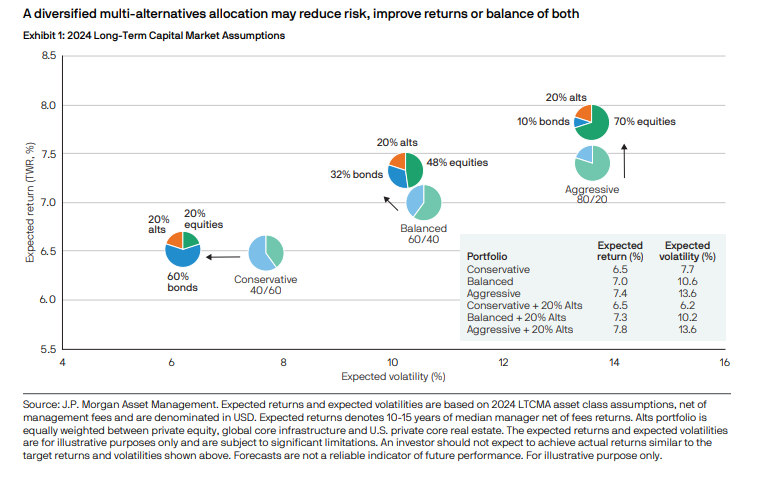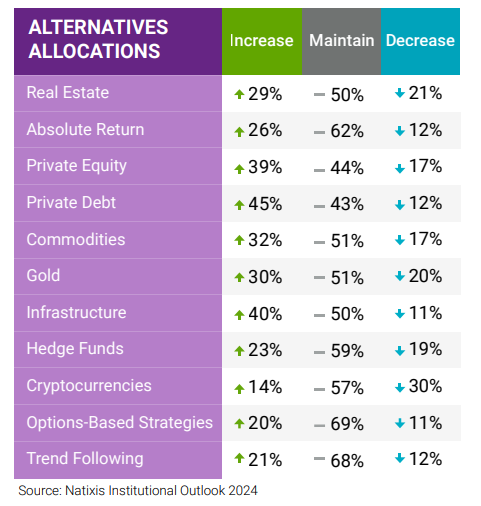How you can have higher returns and lower volatility in your portfolio
While everyone loves a good stock pick, the truth has become patently clear in the last few years – some of the best investments aren’t publicly listed.
It’s been a crazy few years in markets.
We’ve endured (and continue to endure) inflation, watched interest rates skyrocket and now await a few miserly cuts in the coming months. We’ve also seen equity markets hit record highs and there’s a raging debate about whether we are in the midst of an AI bubble.
With volatility and uncertainty the name of the game, it’s hardly surprising that investors have been forced to look for different ways to generate returns and income, and protect their portfolios.
The answer, invariably, has been alternative investments - an asset class that spans private markets, real estate, infrastructure, collectibles and commodities.
Investments in private markets have surged, with global figures for AUM standing at $13.1 trillion. Closer to home, Australian-focused private capital AUM doubled to $139bn in the four years to June 2023. Deal flow has been more muted in 2024, but there’s no question there is growing demand for this space.
Once the domain of
institutions, retail interest has also grown. Bain & Company estimates
that the retail contribution will represent 22% of AUM in 2032.
Ahead of Livewire’s Alternatives in Focus series for 2024, I’ll revisit what alternative investments are, some of the interesting trends in this space and the case for using alternatives in your portfolio.
Alternatives in the numbers
- $23.3 trillion: global AUM in alternative investments by 2027 according to Preqin.
- $59 trillion: private market AUM is tipped to grow at 9% CAGR annually to 2033, according to Bain & Company.
- $850 million: the largest Australian close in four years for a private debt fund was achieved by Ares Asia Direct Lending Fund in December 2023.
- 28%: AustralianSuper is the largest investor in Australian-focused private capital, holding $308bn at February 2024, that is 28% of its total AUM.
- 17% of high-net-worth investors use alternative assets.
What are alternative investments?
While private markets have been the star of alternative investments in the past couple of years, it’s worth remembering that this asset is a broad church.
Alternative investments cover a range of assets that typically perform differently to equities or fixed income; that is, they have a low-performance correlation to them.
Generally, they are categorised as follows:
- Private equity – investing in private companies. This includes venture capital, growth capital and buyouts.
- Private debt – loans financed outside of the banking system or traded on an open market.
- Hedge funds – funds that trade assets and use various strategies to generate returns, such as long-short equity, market-neutral strategies, volatility arbitrage and quantitative approaches.
- Real estate and infrastructure – can span anything from offices to telecommunications towers.
- Commodities – real assets predominately natural resources, such as agriculture, metals, oil and natural gas.
- Collectibles – purchasing and maintaining physical items and hoping they increase value, such as cars, jewellery, wine, coins and art.
- Structured products – products typically created by investment banks using fixed income markets and derivatives. Examples include credit default swaps and collateralised loan obligations.
The case for using alternative investments in your portfolio
Generally speaking, three key reasons exist for using alternative investments in your portfolio.
- Diversification (and portfolio protection when equities and bonds are falling)
- Access to a broader opportunity set
- Potential to enhance yield
With only 44% of Australians confident in the diversification of their portfolios, it stands to reason that it’s an excellent time to consider alternative investments, but more than that, the research also favours an alternatives allocation.
A range of research suggests incorporating alternative investments in your portfolio can actually improve your risk and returns.
For example, this study from JP Morgan used a 20% allocation to alternatives. It found improved returns for volatility in an aggressive portfolio, reduced volatility and improved returns for a balanced portfolio and reduced risk for a conservative portfolio.

UBS conducted a similar study across a range of funds.

From that perspective, it’s hardly surprising that alternative investments have been embraced by a range of investors, such as Australia’s Future Fund where they represent an allocation over 45% to superannuation funds, high-net-worth investors and more recently, retail investors.
In fact, super funds are the second biggest investors in Australian-focused private capital, with 20% of AUM, with family offices the largest holders at
36%.
Where investors are focusing their funds
Private markets continue to be the dominant focus for many institutions for their alternatives allocations.
Private debt in particular is an increased focus, which should come as little surprise given the market environment.
Firstly, in a world where interest rates are starting to fall, private debt can offer more attractive yield compared to listed fixed income and can offer protection against inflation due to floating rate loans.
Secondly, tighter controls on banks have left an ongoing gap in the market for alternative lenders to fill—demand hasn't gone anywhere.
Private equity has had a tougher year, with less deal activity and opportunities somewhat harder to find despite high demand. However, it still remains a popular investment with promising longer-term prospects compared to listed markets.
According to Natixis, across the different alternatives segments, institutions ranked these as the best opportunities going forward: data centres, senior/assisted living, life sciences, essential/affordable housing and student housing.
Notably, these play into some of the biggest themes we see in markets today, from the AI boom to an aging population, healthcare advances, and housing challenges that extend beyond Australia.
Are you invested in alternative investments?
Your super might be invested in alternatives, but is your personal portfolio? And either way, how do you start to research this space?
As one of the fastest-growing asset classes in the investment world, alternative investments are the subject of much research and investment activity.
Livewire's Alternatives in Focus series 2024 aims to help you with your investment decisions. Starting this week, we'll share a range of expert interviews, insights, and educational pieces for any type of investor. Stay tuned!
In the meantime, let us know your top questions on alternative investments in the comments below.
1 topic



